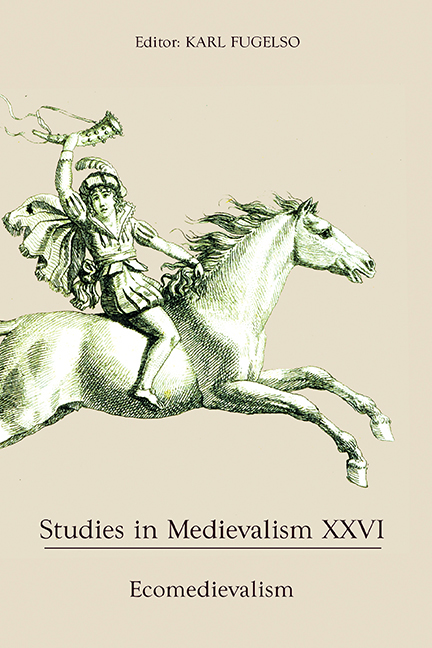Book contents
- Frontmatter
- Studies in Medievalism
- Acknowledgments
- Contents
- List of Illustrations
- Editorial Note
- I Ecomedievalism: Some Perspective(s)
- II Interpretations
- Fragmentary Dreams: John Aubrey's Medieval Heritage Construction
- Charter Horns and the Antiquarian Imagination in Early Modern England
- Giving Voice to Griselda: Radical Reimaginings of a Medieval Tale
- Medieval and Futuristic Hells: The Influence of Dante on Ellison's “I Have No Mouth and I Must Scream”
- Reading Westeros: George R. R. Martin's Multi-Layered Medievalisms
- Modernity in the Middle: The Medieval Fantasy of (Coopted) Feminism in Disney's Maleficent
- Future Medieval: (Neo)Medievalism in Babylon 5 and Crusade
- Cosmopolitan Anxieties and National Identity in the Netflix Marco Polo
- Mapping Everealm: Space, Time, and Medieval Fictions in The Quest
- Medievalisms of the Mind: Undergraduate Perceptions of the “Medieval” and the “Middle Ages”
- Mask of the Medieval Corpse: Prosopopoeia and Corpsepaint in Mayhem's De Mysteriis Dom Sathanas
- Contributors
- Miscellaneous Endmatter
Giving Voice to Griselda: Radical Reimaginings of a Medieval Tale
from II - Interpretations
Published online by Cambridge University Press: 15 September 2017
- Frontmatter
- Studies in Medievalism
- Acknowledgments
- Contents
- List of Illustrations
- Editorial Note
- I Ecomedievalism: Some Perspective(s)
- II Interpretations
- Fragmentary Dreams: John Aubrey's Medieval Heritage Construction
- Charter Horns and the Antiquarian Imagination in Early Modern England
- Giving Voice to Griselda: Radical Reimaginings of a Medieval Tale
- Medieval and Futuristic Hells: The Influence of Dante on Ellison's “I Have No Mouth and I Must Scream”
- Reading Westeros: George R. R. Martin's Multi-Layered Medievalisms
- Modernity in the Middle: The Medieval Fantasy of (Coopted) Feminism in Disney's Maleficent
- Future Medieval: (Neo)Medievalism in Babylon 5 and Crusade
- Cosmopolitan Anxieties and National Identity in the Netflix Marco Polo
- Mapping Everealm: Space, Time, and Medieval Fictions in The Quest
- Medievalisms of the Mind: Undergraduate Perceptions of the “Medieval” and the “Middle Ages”
- Mask of the Medieval Corpse: Prosopopoeia and Corpsepaint in Mayhem's De Mysteriis Dom Sathanas
- Contributors
- Miscellaneous Endmatter
Summary
In recent decades, scholars of medieval literature have increasingly turned their attention to post-medieval interpretations and adaptations of medieval texts, including editions and adaptations of Chaucer's works. Numerous studies, such as those by Steve Ellis and Stephanie Trigg, consider the ways in which authors have reimagined and responded to Chaucer's corpus, from the Early Modern period to the present, in various media. Similarly, Candace Barrington and Jonathan Hsy are expanding critical awareness of Chaucer's dissemination in other cultures through the public nature of their Global Chaucers project. Their growing online database of post-1945 and non-Anglophone adaptations of the poet's works suggests that his influence is considerably more widespread than previously understood. Other studies, including those by David Matthews, Velma Bourgeois Richmond, and Mary Flowers Braswell, examine adaptations and editions of Chaucer's works aimed at primarily child readers during the Victorian and Edwardian periods, and highlight the now well-known adaptors Charles Cowden Clarke (1787–1877) and Mary Eliza Haweis (1848–98). Such studies often herald the volumes by Clarke and Haweis as forerunners of the nineteenth- and early twentieth-century popular editions of Chaucer's works, and Haweis in particular receives frequent acclaim as an early and potentially proto-feminist female adaptor. According to Siân Echard, Haweis's Chaucer for Children (1877) provided for turn-of-the-century audiences a “tantalizing” alternative to more traditional editions of Chaucer's works through its textual commentary, which articulates dissatisfaction with the medieval poet's portrayal of female figures.
Critics, however, frequently overlook writers who adapted and published individual Chaucerian narratives outside of the more familiar and frequently moralizing male-narrated framework of editions or collections, primarily of The Canterbury Tales. They also almost entirely overlook female writers prior to Haweis whose adaptations are progressive, even radical, in their treatment of women. This article introduces one such neglected writer – Eleanora Louisa Hervey (née Montagu; 1811–1903) – and her poetic responses to the Griselda story, including post-medieval editions of Chaucer's Clerk's Tale that were popular in the middle decades of the nineteenth century.
- Type
- Chapter
- Information
- Studies in Medievalism XXVIEcomedievalism, pp. 87 - 116Publisher: Boydell & BrewerPrint publication year: 2017



